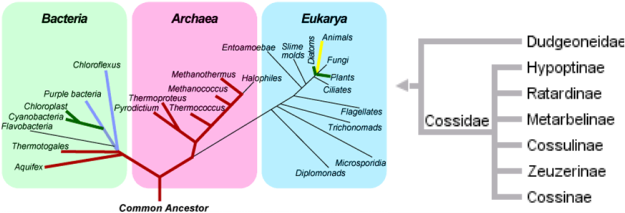Endoxyla leucomochla (Witchetty Grub)
Classification and Phylogeny
Domain: Eukarya
Kingdom: Animalia
Phylum: Arthropoda
Class: Insecta
Order: Lepidoptera
Family: Cossidae
Genus: Endoxyla
Species: leucomochla
Common Name: Witchetty Grub
Domain: Eukarya
This domain contains organisms that have cells with a true nucleus, multiple linear chromosomes, and membrane bound organelles.
Kingdom: Animalia
Members of the Animalia kingdom do not have an alternation of generations and lack cell walls which allow for locomotion of species.
Phylum: Arthropoda
All members of this phylum have segmented bodies, an exoskeleton, and grow by molting.
Class: Insecta
This class has distinctive characteristics of a chitinous exoskeleton, compound eyes, and three pairs of jointed legs.
Order: Lepidoptera
All members of this order are moths and butterflies. All larvae are either catepillars or classified as grubs that are herbivores or burrowers of roots and stems.
Family: Cossidae
This is a family of moths with much reduced mouth-parts and bipectinate antennae. The larvae generally bore into trees and pupation occurs in the tunnel. Many species of this family are found in Australia.
Genus: Endoxyla
Members of this genus are all wood moths with larveae that bore into eucalyps or acacias. The adults moths are camouflaged perfectly to match the tree or bush they emerge from.
Species: leucomochla
This species is endemic to Australia and is commonly known as the Witchetty Grub. Adult moths only purpose is reproduction and they live off the food storage built up in larval form.
To learn where the Witchetty Grub lives, visit Habitat and Geography.
Kingdom: Animalia
Phylum: Arthropoda
Class: Insecta
Order: Lepidoptera
Family: Cossidae
Genus: Endoxyla
Species: leucomochla
Common Name: Witchetty Grub
Domain: Eukarya
This domain contains organisms that have cells with a true nucleus, multiple linear chromosomes, and membrane bound organelles.
Kingdom: Animalia
Members of the Animalia kingdom do not have an alternation of generations and lack cell walls which allow for locomotion of species.
Phylum: Arthropoda
All members of this phylum have segmented bodies, an exoskeleton, and grow by molting.
Class: Insecta
This class has distinctive characteristics of a chitinous exoskeleton, compound eyes, and three pairs of jointed legs.
Order: Lepidoptera
All members of this order are moths and butterflies. All larvae are either catepillars or classified as grubs that are herbivores or burrowers of roots and stems.
Family: Cossidae
This is a family of moths with much reduced mouth-parts and bipectinate antennae. The larvae generally bore into trees and pupation occurs in the tunnel. Many species of this family are found in Australia.
Genus: Endoxyla
Members of this genus are all wood moths with larveae that bore into eucalyps or acacias. The adults moths are camouflaged perfectly to match the tree or bush they emerge from.
Species: leucomochla
This species is endemic to Australia and is commonly known as the Witchetty Grub. Adult moths only purpose is reproduction and they live off the food storage built up in larval form.
To learn where the Witchetty Grub lives, visit Habitat and Geography.
